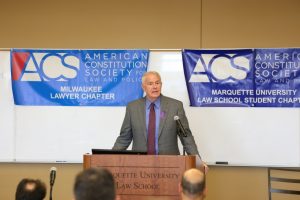 On October 20, I had the honor of moderating a panel discussion at the Law School devoted to Voting Rights Litigation in Wisconsin. The event was co-sponsored by the Marquette University Law School Student Chapter of the American Constitution Society and the Milwaukee Chapter of the American Constitution Society (ACS). A crowd of approximately 60 persons witnessed a lively presentation on the right to vote under the U.S. Constitution, recent legislation in Wisconsin that places burdens on the ability of some people to vote in our State, and the status of litigation in the federal courts challenging these state laws.
On October 20, I had the honor of moderating a panel discussion at the Law School devoted to Voting Rights Litigation in Wisconsin. The event was co-sponsored by the Marquette University Law School Student Chapter of the American Constitution Society and the Milwaukee Chapter of the American Constitution Society (ACS). A crowd of approximately 60 persons witnessed a lively presentation on the right to vote under the U.S. Constitution, recent legislation in Wisconsin that places burdens on the ability of some people to vote in our State, and the status of litigation in the federal courts challenging these state laws.
The event began with a welcome from the Chair of the Milwaukee Chapter of the ACS, Attorney Craig Mastantuono. Attorney Mastantuono began with a description of the mission of the American Constitution Society and the benefits of membership. He also noted the excellent timing of the day’s event, given the attention currently being given to the integrity of the American voting system. Then Attorney Mastantuono introduced the Mayor of Milwaukee, the Honorable Tom Barrett.
Mayor Barrett began his remarks by providing the Marquette University law students in attendance with a bit of career advice: namely, the importance of being nice to your colleagues in the workplace. Turning to topic of the federal judiciary, Mayor Barrett criticized lawmakers who impose litmus tests on judicial appointees, in a misguided attempt to ensure that there is “only one type of thinking in our court system.” Mayor Barrett also expressed his disappointment in the fact that Wisconsin is no longer a national leader in ensuring access to the ballot, and criticized recent state laws that have made it more difficult to vote in the City of Milwaukee. Finally, while he touted the benefits of early voting as a means of improving ballot access, the Mayor explained that there are limits to the City’s ability to expand the early voting process due to the City’s interest in maintaining a well-administered voting process.
The panel discussion followed, which included three attorneys who have substantial experience in litigating voting rights issues in the courts. Joshua Kaul is an attorney at Perkins Coie whose work focuses on voting-rights litigation. Josh is currently involved in cases challenging voting restrictions in several states, including a case in Wisconsin, One Wisconsin Institute v. Thomsen, that was tried before District Judge James Peterson in May and resulted in the invalidation of several provisions of Wisconsin election law. Karyn Rotker serves as Senior Staff Attorney for the American Civil Liberties Union of Wisconsin, heading its Poverty, Race & Civil Liberties Project. She works on such issues as transportation and environmental justice, voting rights, fair housing, police misconduct, and immigrants’ rights. She is counsel in the case of Frank v. Walker, which was tried before District Judge Adelman and has been the subject of multiple opinions in the Seventh Circuit. Matthew O’Neill is a shareholder at Fox, O’Neill & Shannon, S.C. His practice focuses on commercial litigation, appeals, arbitration, shareholder disputes, and election and campaign finance law. Matt has trained lawyers to observe at the polls on behalf of the Democratic Party, and has testified before Congress about voting rights issues, including voter suppression efforts, the real problems with heavy turnout elections, and the absence of voter fraud.
The panel discussion began with an examination of where the right to vote is located in our constitutional system, and the standard of review that the U.S. Supreme Court has applied to evaluate challenges to state laws that infringe upon the right to vote. This included a discussion of the Supreme Court’s 2008 decision in Crawford v. Marion County Election Board, which considered Indiana’s Voter I.D. law. The panelists then discussed the impact of approximately 20 recent changes to Wisconsin election laws and the effect of those changes on the ability of Wisconsin residents to exercise their right to vote. The basis of the legal arguments made by the plaintiffs in both the Frank v. Walker case and the One Wisconsin Institute v. Thomsen case were also examined, and the panelists provided their view of the status of the ongoing litigation.
The entire event can be viewed via the following link:
https://law-media.marquette.edu/Mediasite/Play/91eb4c2610d34115aeb3726a803ab7331d
All in all, it was a very timely and illuminating discussion sponsored by the American Constitution Society.
